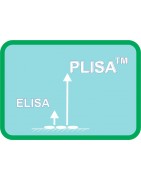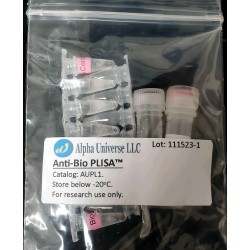Phage-Linked Immunosorbent Assay
PLISA™ is a modification of ELISA. While enzymes are used for signal-generation and amplification in ELISA, the same role in PLISA™ is played by luciferase-encoding bacteriophages. These bacteriophages are connected to polypeptides that specifically recognize either immunoglobulins or biotin residue. Due to these binding affinities, bacteriophages can be used as substitutes for secondary antibodies in the conventional ELISA protocol. Bacteriophages bound through a sandwich to antigens retain the ability to infect the appropriate host bacterial cells. Such infection triggers production of hundreds and even thousands of luciferase molecules in each infected cell. In addition, each infected cell is able to produce hundreds of new luciferase-encoding phage particles that can infect additional cells. This two-step signal amplification mechanism of PLISA™ allows PLISA™ to achieve ten-fold or higher sensitivity compared to that of ELISA. PLISA™ kits contain components that allow effortless conversion of ELISA into PLISA™. Although PLISA™ relies on the use of bacteriophages and live bacteria, PLISA™ does not involve use of aseptic techniques standard for microbiology. Due to the short incubation time and high concentrations of completely harmless bacterial cells used in PLISA™, the PLISA™-specific steps can be performed using the same lab practices as those required to carry out ELISA.



